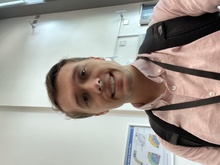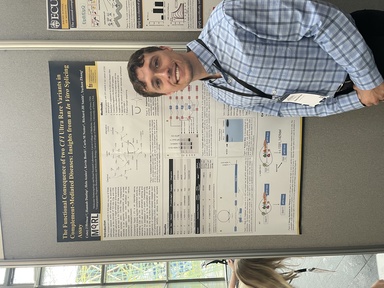
Growing up in the small town of Huxley, Iowa, Cobey (Heinen) Donelson wanted to be a semi-truck driver.
Now entering the Biomedical Science Graduate Program at the University of Iowa, he has taken a different route.
Donelson’s stepmother is a professor of chemical engineering at Iowa State University, so his exposure to research began at a young age. In high school, he ran an experiment about the caustic properties of certain household cleaning products.
“Basically, I was bored, and I dissolved a brick with hydrochloric acid and a bunch of other cleaning products,” he says.
Throughout middle and high school, the influence of family members’ careers in science made Donelson consider becoming a medical doctor.
“I wanted to be a neurosurgeon. I think I was watching Grey’s Anatomy at the time,” he says. “But when I shadowed physicians, I quickly realized that this was not the track for me.”
Donelson began his undergraduate studies at the University of Northern Iowa (UNI). He joined a research lab there in the summer after his freshman year, where he delved into the world of spectroscopy. The lab director, Shoshanna Coon, PhD, became a mentor and helped Donelson realize that he had a calling as a scientist.
“That’s when I started to fall in love with research,” he says.
In his sophomore year, he transferred to the University of Iowa. Though he loved the campus and faculty at UNI, he was eager to take advantage of the research opportunities available at an academic medical center. Immediately upon starting at Iowa, he joined the Molecular Otolaryngology and Renal Research Laboratories (MORL) under principal investigator and lab director Richard Smith, MD.
“That solidified me wanting to pursue a PhD,” Donelson says. “I stuck with that lab the rest of my time in undergrad.”

Smith’s lab studies the complement cascade, which is part of the body’s innate immune system. Donelson’s work in the lab has focused on genetic factors that may disrupt how this immune pathway is regulated and the diseases that can arise from an unregulated system.
“I study what’s called the alternative pathway, which is continuously active in all of us,” Donelson says. “If you have an unregulated alternative pathway, that will cause your cells to burst open, so if you have a genetic defect in one of the regulators, potentially that could drive you to develop complement-mediated diseases.”
When Donelson began working in the lab, he had no background in the complement system. During his time as an undergraduate researcher, he made significant contributions to understanding the causative relationship between rare genetic variants in complement regulators and complement-mediated diseases such as complement 3 glomerulopathy (C3G), atypical hemolytic uremic syndrome (aHUS), and recurrent infections.
“I just stumbled upon this lab, but it turned out to be the love of my life,” he says. “These diseases that they study are so rare, and I would have never thought to contribute to them. But we have an annual C3G conference for people diagnosed with the disease, and it’s just so heartwarming to see the faces of the people that you’re trying to help.”
Through this work, Donelson has also contributed to a published paper and presented his findings at international conferences. Though he’s loved his time with MORL, Donelson plans to keep an open mind through his lab rotations in the biomedical sciences program.
“I’m a very determined person,” Donelson says. “Right now, I know I want to continue my education and pursue a PhD that will let me help people down the line. I’ve been around science my whole life. It’s a huge field, and you can do anything in it. I’m just finding my place in that pond.”